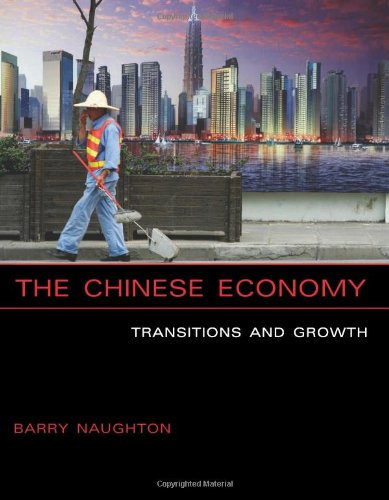The Chinese Economy: Transitions and Growth ebook download
Par brobst ilene le lundi, juillet 18 2016, 20:22 - Lien permanent
The Chinese Economy: Transitions and Growth. Barry Naughton

The.Chinese.Economy.Transitions.and.Growth.pdf
ISBN: 0262140950,9781429455343 | 504 pages | 13 Mb

The Chinese Economy: Transitions and Growth Barry Naughton
Publisher:
The S&P's report, “For sub-Saharan Africa, China's rebalancing poses risks and opportunities”, indicated agricultural exports from Ghana stands to gain from the new China economic transition. Emphasis on urbanisation, services and social development, and consequently also greater reliance on private consumption as a source of economic growth. Case in point: China, where labor shortages are working to slow growth in the nation's economy. China is making the transition from cheap exporter to a consumer-led economy. While these high savings have undoubtedly been good for China's economic growth, they have not necessarily been good for the global economy: the excess of domestic savings over investment has fuelled China's current account surpluses and the United States' current account deficits, leading Jane Golley is an economist focused on a range of Chinese transition and development issues and an Adjunct Director of the Australian Centre on China in the World. Market Forces and the Chinese Economic Transition. These platform companies borrowed heavily from banks during the stimulus, financing a rapid build out of infrastructure that helped sustain economic growth despite the ongoing global turmoil. �Conversely, exporters of agricultural products, such as According to Six, a rapid shift could cause a steeper decline in China's overall GDP and import growth rates, leading to a fall in SSA commodity exports to the country. In fact, the economy is already domestically driven, but it's being propped up by government investment spending – uncertain foundations even for a country as cash-rich as China – rather than consumers themselves. On the side of western-style democracy stood Minxin Pei, the director of the Keck Center for International and Strategic Studies at Claremont McKenna College and author of China's Trapped Transition: The Limits of Developmental Autocracy in which Pei examines the sustainability of the Chinese On the economic front, China's growth has been driven by investments at home and exports to developed countries—trends that are not sustainable in the long run. Market forces always work to whatever to work toward long-term good. Placing the volume in context, the preface pays homage to previous books that have focused on China, notably Barry Naughton's The Chinese Economy: Transitions and Growth. The government is attempting a shift away from cheap exports and towards an economy fuelled by Chinese's growing ranks of consumers.